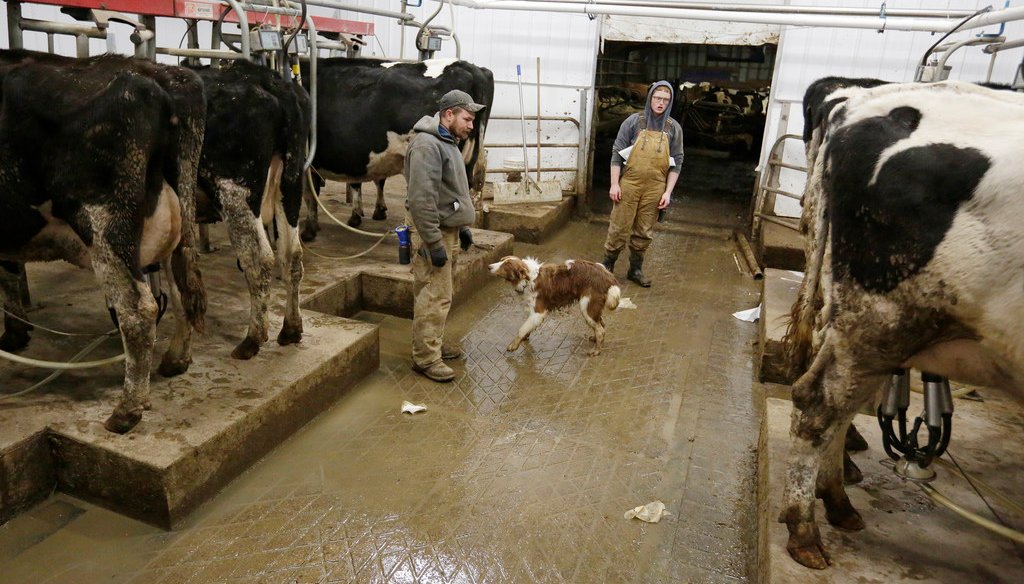

Our only agenda is to publish the truth so you can be an informed participant in democracy.
We need your help.


Michael Dodd and hired hand Derek Scott milk 60 head of cows in a new milking parlor near Pickett, Wis., Wednesday November 14, 2018. (Joe Sienkiewicz/USA Today NETWORK-Wisconsin)
Farmers were particularly hard hit by retaliatory tariffs imposed on the U.S. after Trump slapped tariffs on China, Canada, Mexico and other countries in 2018 and 2019.
Family farm bankruptcies rose from 498 in 2018 to 595 in 2019.
But farm bankruptcies have been rising each year since 2014.
And experts say the trade wars were just one factor driving the increase, along with low commodity prices and natural disasters.
In wide-ranging recent comments criticizing President Donald Trump, Democratic presidential candidate Joe Biden touched on a topic that hits home in Wisconsin — struggling farms.
Speaking in Manitowoc on Sept. 21, 2020, Biden said Trump started a trade war that "led to a surge in farm bankruptcies."
To be sure, times are tough for Wisconsin farmers, particularly in dairy.
In 2019 alone, Wisconsin lost 818 dairy farms, part of an accelerating decline in which about one-quarter of the state’s dairy farms have gone out of business since 2014.
But amid such a long-running trend, is it fair to put the onus for a "surge" on Trump’s trade wars?
Let’s dig in.
Campaigning as a dealmaker in 2016, Trump promised to renegotiate U.S. trade deals in America’s favor, and once in office he imposed tariffs seeking to achieve that end.
Many countries — including China, Canada, Mexico — as well as the European Union retaliated with tariffs of their own that struck U.S. agricultural products.
Between July 2018 and August 2019, for example, the Brookings Institution reported the U.S. announced tariffs on more than $550 billion in Chinese products, and China retaliated with tariffs on more than $185 billion on U.S. products. U.S. producers were doubly hit since numerous studies showed the U.S. companies primarily paid for the U.S. tariffs.
The toll on farmers was heavy enough the federal government created the Market Facilitation Program, which paid out more than $14 billion to farmers in 2018 and 2019 to mitigate the impact of the trade wars.
Amid this environment, farm bankruptcies did rise in 2019 — the point where you’d expect to see a spike given the trade battles occurring at the time.
That year, 595 family farmers filed for Chapter 12 bankruptcies nationwide, up from 498 filings a year earlier, Reuters and others reported. Chapter 12 is a bankruptcy code created during the 1980s farm crisis to allow family farmers and small fishing operations to keep operating while they work out plans to repay lenders.
Wisconsin led the nation with 57 bankruptcy filings, 16 more than any other state.
But experts say you can’t draw a dark line between the trade wars and the rise in bankruptcies.
Though the jump from 2018 to 2019 was the largest in recent years, bankruptcies have been rising for a while.
After Chapter 12 bankruptcies dropped from 723 in 2010 to 361 in 2014, the number has steadily grown since.
Farm bankruptcies did drop slightly in the first half of 2020 — the total of 284 was down 10 from the same period in 2019 — but that was "due in large part" to government payments made to farmers as part of the Coronavirus Food Assistance Program, according to the American Farm Bureau Federation.
RELATED: Dems exaggerate in slamming Trump farm bailouts as "handout for large agricultural companies"
In addition, trade wars are far from the only factor at play for farmers in Wisconsin and nationwide.
Reuters described it this way:
The increase in (2019 bankruptcies) had been somewhat expected, bankruptcy experts and agricultural economists said, as farmers face trade battles, ever-mounting farm debt, prolonged low commodity prices, volatile weather patterns and a fatal pig disease that has decimated China’s herd.
John Newton, chief economist at the Farm Bureau, cited many of the same factors in an interview with PolitiFact Wisconsin.
"The farm bankruptcies are a function of not only retaliatory tariffs on U.S. agriculture by China, but also years of low commodity prices created by a global economic slowdown and large supplies of grains, oilseeds and livestock products internationally and recent natural disasters," Newton said in an email. "I don’t think you can lay the blame of higher farm bankruptcies on the retaliatory tariffs alone."
Speaking in Manitowoc, Biden said Trump started a trade war that "led to a surge in farm bankruptcies."
The trade wars have indeed hit farmers hard. And bankruptcies rose at the height of the trade wars, increasing more than they had in the four prior years.
But this claim oversimplifies by listing the trade wars alone as being responsible for that increase.
We define Half True as a statement that is partially accurate but leaves out important details or takes things out of context. That fits here.
This fact check is available at IFCN’s 2020 US Elections FactChat #Chatbot on WhatsApp. Click here, for more.
Joe Biden, Manitowoc speech, Sept. 21, 2020
Email exchange with John Newton, chief economist at the American Farm Bureau Federation, Sept. 22, 2020
Forbes, U.S. Farm Bankruptcies Reach Eight-Year High [Infographic], Feb. 10, 2020
Reuters, U.S. farm bankruptcies hit an eight-year high: court data, Jan. 30, 2020
PolitiFact Wisconsin, Dems exaggerate in slamming Trump farm bailouts as "handout for large agricultural companies," July 2, 2020
Brookings Institute, More pain than gain: How the US-China trade war hurt America, Aug. 7, 2020
National Bureau of Economic Research, Who's Paying for the US Tariffs? A Longer-Term Perspective, January 2020
Wisconsin Farmer, Wisconsin continues to lead U.S. in farm bankruptcies, Jan. 31, 2020
American Farm Bureau Federation, Farm Bankruptcies Slow, More Aid Needed, Aug. 4, 2020
In a world of wild talk and fake news, help us stand up for the facts.
